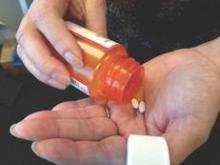Researchers have identified a “sweet spot” target for reducing low-density lipoprotein cholesterol levels with statin therapy that is associated with the lowest risk of adverse cardiac outcomes.
A study published online June 20 in JAMA Internal Medicine analyzed data from an Israeli health care organization between 2009-2013 and identified 31,619 patients with ischemic heart disease, aged 30-84 years, who were being treated with statins and were at least 80% adherent to the medication regime.
The analysis showed individuals who achieved a “moderate” LDL-C level – between 70.1-100.0 mg/dL – after 1 year of statin treatment had an 11% lower incidence of major adverse cardiac events, compared with those with a “high” LDL-C level – between 100.1-130.0 mg/dL (95% confidence interval, 0.84-0.94; P less than .001).
However researchers observed no significant difference in the risk of adverse cardiac events between the moderate group and those who achieved a “low” LDL-C equal to or less than 70.0mg/dL (hazard ratio, 1.02; 95% CI, 0.97-1.07; P = .54).
In a further analysis that included 54,884 individuals who were at least 50% adherent to their statin therapy, there was a slightly increased risk of major cardiac events in patients who achieved a low LDL-C, compared with those in the moderate LDL-C group, and a significant 13% reduction in risk in the moderate LDL-C group, compared with the high LDL-C group.
“Whereas this may reflect clinical risk of low levels of LDL-C, these results further support the main findings of this study that achieving a level below 70 mg/dL is not beneficial for all patients,” wrote Dr. Morton Leibowitz, from the Clalit Research Institute, Tel Aviv, and his coauthors.
Adjustment for age did not significantly alter the interaction between LDL-C levels and the risk of adverse cardiac events (JAMA Intern Med. 2016 Jun 20. doi: 10.1001/jamainternmed.2016.2751).
“The question of the association between achieved LDL-C levels and major adverse cardiac events for secondary prevention has become highly relevant, particularly in the real-world context of patients excluded from [randomized, controlled trials],” the authors wrote, suggesting that their data only partially support recent claims that lower LDL-C is better for cardiac outcomes.
“Our findings of significantly lower risk of MACEs associated with achieved LDL-C level of less than 100.0 mg/dL but not with achieved LDL-C of less than 70.0 mg/dL suggest a target for long-term statin treatment.”
The study was funded by the Clalit Research Institute. No conflicts of interest were reported.


